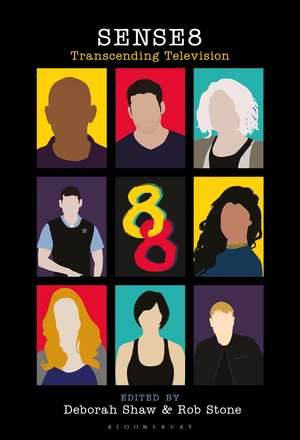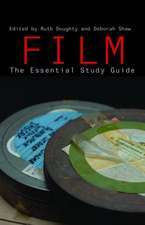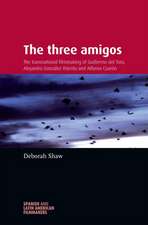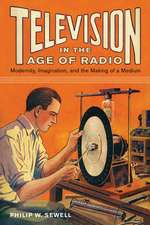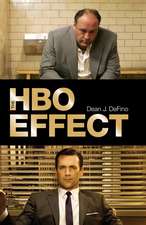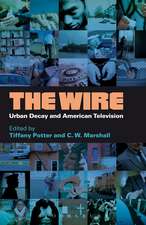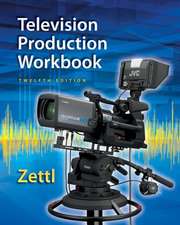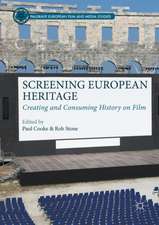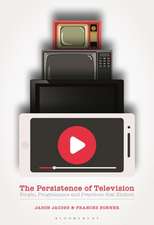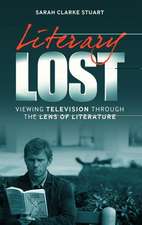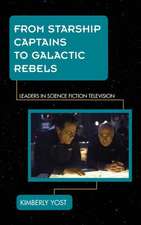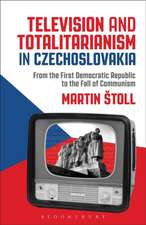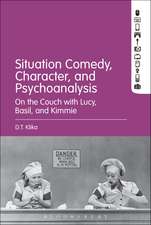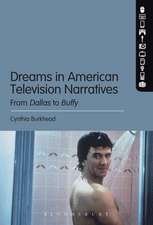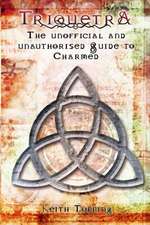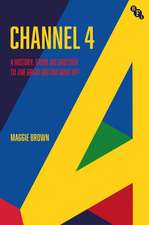Sense8: Transcending Television
Editat de Deborah Shaw, Rob Stoneen Limba Engleză Hardback – 16 iun 2021
| Toate formatele și edițiile | Preț | Express |
|---|---|---|
| Paperback (1) | 197.77 lei 43-57 zile | |
| Bloomsbury Publishing – 16 noi 2022 | 197.77 lei 43-57 zile | |
| Hardback (1) | 568.87 lei 43-57 zile | |
| Bloomsbury Publishing – 16 iun 2021 | 568.87 lei 43-57 zile |
Preț: 568.87 lei
Preț vechi: 815.99 lei
-30% Nou
Puncte Express: 853
Preț estimativ în valută:
108.85€ • 113.96$ • 90.07£
108.85€ • 113.96$ • 90.07£
Carte tipărită la comandă
Livrare economică 07-21 aprilie
Preluare comenzi: 021 569.72.76
Specificații
ISBN-13: 9781501352935
ISBN-10: 1501352938
Pagini: 256
Ilustrații: 20 bw illus
Dimensiuni: 152 x 229 x 21 mm
Greutate: 0.5 kg
Editura: Bloomsbury Publishing
Colecția Bloomsbury Academic
Locul publicării:New York, United States
ISBN-10: 1501352938
Pagini: 256
Ilustrații: 20 bw illus
Dimensiuni: 152 x 229 x 21 mm
Greutate: 0.5 kg
Editura: Bloomsbury Publishing
Colecția Bloomsbury Academic
Locul publicării:New York, United States
Caracteristici
Uses the series as a prism through which to consider and debate the global reach of Netflix and the evolution of contemporary television
Notă biografică
Deborah Shaw is Professor of Film and Screen Studies at the University of Portsmouth, UK. She is the founding co-editor of the journal Transnational Cinemas (Now Transnational Screens), and her books include Contemporary Latin American Cinema: Ten Key Films (2003), The Three Amigos: The Transnational Filmmaking of Guillermo del Toro, Alejandro González Iñárritu, and Alfonso Cuarón (2013), The Transnational Fantasies of Guillermo del Toro (co-edited with Ann Davies and Dolores Tierney, 2014), and Latin American Women Filmmakers: Production, Politics, Poetics (co-edited with Deborah Martin 2017). Rob Stone is Professor of Film Studies at the University of Birmingham, UK. He is the author of Spanish Cinema (2001), Julio Medem (2007) and Walk, Don't Run: The Cinema of Richard Linklater (2013, 2nd edn 2018) and co-author of Basque Cinema: A Cultural and Political History (2016). He also co-edited Screening Songs in Hispanic and Lusophone Cinema (2013), A Companion to Luis Buñuel (2013) and The Routledge Companion to World Cinema (2018).
Cuprins
List of figuresList of contributorsIntroduction: A Sense8 of BelongingDeborah Shaw and Rob Stone 1. What's Going On?: Netflix and the Commissioning of Sense8Amanda Lotz2. You Are No Longer Just You: Netflix, Sense8 and the Evolution of TelevisionZoë Shacklock3. Skip Intro?: Sense8's Title SequenceJames Walters4. The Sense8 Bible: The Creation of a New Creed for Our TimesDeborah Shaw5. What's Queer about a Cluster?: Sense8's Polycentric ImaginaryRosalind Galt6. Between Necropower and Erotopolitics: Community and Clusterfuck as Alloerotic DistractionJohn Lessard7. Sing a Song of Sense8: Musicality, Multiplicity and SynchronicityRob Stone8. Sense8 and The City: Frontier CosmopolitanismLuis Freijo9. The Common Good: Birth, Death and Self-sacrifice in/ofSense8 Will McKeown10. Dancing in the Streets: The Politics of Sense8's Pleasure ActivismSo Mayer11. #WeAreTheGlobalCluster: Affectivity, Resistance and Sense8 FandomRox Samer and Laura Horak12. Revisiting the ClusterCáel M. KeeganIndex
Recenzii
Sense8 (2015-2018), conceived of and produced by the Wachowskis was a Netflix phenomenon that transcended multiple boundaries of sexuality, gender, nation and sensibility just as the fledgeling streaming platform was also carving out a progressive identity as a producer of original content. The multiple contributions to this volume featuring both key scholars and emergent voices show that this was a complex relationship in which the desires of the producers, fans and the platform were not always in alignment. Bringing together television and film studies approaches with queer and fan studies perspectives, this multi-faceted volume highlights the powerful impact Sense8 had as something more and other than conventional film or television. It also brilliantly shows the ways that the trans*, queer and polyamorous intimacies and empathy represented in the show were refracted in the communities surrounding the show, constituting a comet-like transformative event at the centre of progressive contemporary screen cultures.
Suitably for a volume focused on a series whose motto was 'diversity in unity', the essays in this superb collection approach Sense8 from divergent but nicely complementary angles, illuminating it in relation to matters of representation, aesthetics, medium specificity, philosophy, spectatorship and activism. Exalting the series' affirmative and jubilant queer globalism, while also critical of its limitations and shortfalls, this expertly crafted and eminently readable anthology evaluates Sense8's impact and relevance, while using it as a means of pondering over questions of community, communality, connection, connectivity and collectivity in our divided and fractured world. I couldn't think of more pressing issues to attend to at this moment in time.
Assembling a magnificent cluster of scholars, Sense8: Transcending Television is an indispensable companion to the Netflix series. Beautifully written and pulsing with critical insights, this collection of essays demonstrates the same 'radical empathy' embodied by Sense8 itself. It reveals how the sensate - a group of individuals bound to one another despite distance and difference - mirrors the immersive and collective viewing experience of audiences in the streaming era. Shaw and Stone's collection not only articulates the generative potential of Sense8's queer and trans world building - it heightens it.
Suitably for a volume focused on a series whose motto was 'diversity in unity', the essays in this superb collection approach Sense8 from divergent but nicely complementary angles, illuminating it in relation to matters of representation, aesthetics, medium specificity, philosophy, spectatorship and activism. Exalting the series' affirmative and jubilant queer globalism, while also critical of its limitations and shortfalls, this expertly crafted and eminently readable anthology evaluates Sense8's impact and relevance, while using it as a means of pondering over questions of community, communality, connection, connectivity and collectivity in our divided and fractured world. I couldn't think of more pressing issues to attend to at this moment in time.
Assembling a magnificent cluster of scholars, Sense8: Transcending Television is an indispensable companion to the Netflix series. Beautifully written and pulsing with critical insights, this collection of essays demonstrates the same 'radical empathy' embodied by Sense8 itself. It reveals how the sensate - a group of individuals bound to one another despite distance and difference - mirrors the immersive and collective viewing experience of audiences in the streaming era. Shaw and Stone's collection not only articulates the generative potential of Sense8's queer and trans world building - it heightens it.
